对外投资国别指南-菲律宾
解析菲律宾投资政策及赴菲投资注意事项

解析菲律宾投资政策及赴菲投资注意事项
佚名
【期刊名称】《华人世界》
【年(卷),期】2010(000)007
【摘要】菲律宾对外国投资的市场准入规定1.投资主管部门菲律宾贸工部是负责投资政策实施和协调、促进投资便利化的主要职能部门。
贸工部下设的投资署负责投资政策包括外资政策的实施和管理。
【总页数】2页(P102-103)
【正文语种】中文
【中图分类】F832.48
【相关文献】
1.赴印尼开展贸易投资活动应注意事项
2.浅析外资企业在泰国的合法形式--兼论我国投资者赴泰投资注意事项
3.菲律宾驻广州总领事金举深:菲中小企业亟需辅助和投资
4.菲律宾的投资环境与投资政策
5.菲律宾官员称中国投资开发镍镁等矿藏令菲矿投翻番
因版权原因,仅展示原文概要,查看原文内容请购买。
在菲律宾开展投资合作所需要的相关手续和注意事项
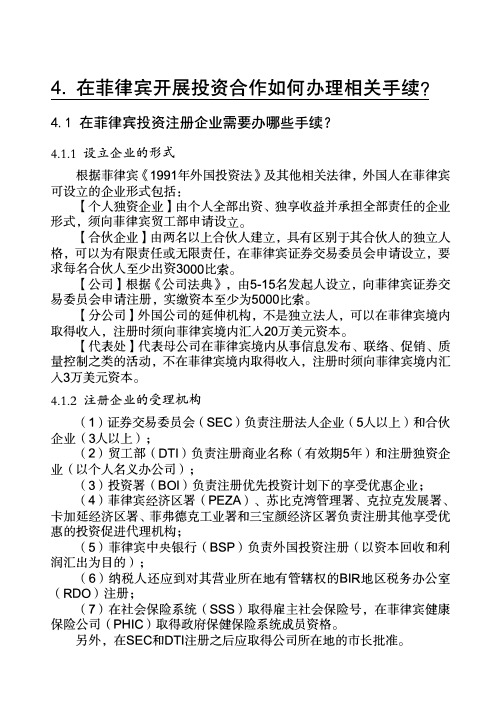
4在菲律宾开展投资合作如何办理相关手续?4.1在菲律宾投资注册企业需要办哪些手续?4.1.1设立企业的形式根据菲律宾《1991年外国技资法》及其他相关法律,外国人在菲律宾可设立的企业形式包括:[个人独资企业]由个人全部出资、独享收益并承担全部责任的企业形式,须向菲律宾贸工部申请设立。
[合伙企业]由两名以上合伙人建立,具有区别于其合伙人的独立人格,可以为有限责任或无限责任,在菲律宾证券交易委员会申请设立,要求每名合伙人至少出资3000比索。
[公司]根据《公司法典》,由5-15名发起人设立,向菲律宾证券交易委员会申请注册,实缴资本至少为5000比索。
[分公司]外国公司的延伸机构,不是独立法人,可以在菲律宾境内取得收入,注册时须向菲律宾境内汇入20万美元资本。
[代表处]代表母公司在菲律宾境内从事信息发布、联络、促销、质量控制之类的活动,不在菲律宾境内取得收入,注册时须向菲律宾境内汇人3万美元资本。
4.1.2注册企业的受理机构( 1)证券交易委员会(SEC)负责注册法人企业(5人以上)和合伙企业(3人以上);(2)贸工部(DTI)负责注册商业名称(有效期5年)和注册独资企业(以个人名义办公司);(3)投资署(BOI)负责注册优先投资计划下的享受优惠企业;(4)菲律宾经济区署(PE ZA) ,苏比克湾管理署、克拉克发展署、卡加延经济区署、菲弗德克工业署和三宝颜经济区署负责注册其他享受优惠的投资促进代理机构;( 5)菲律宾中央银行(BSP)负责外国投资注册(以资本回收和利润汇出为目的);( 6)纳税人还应到对其营业所在地有管辖权的BIR地区税务办公室(RDO)注册;( 7)在社会保险系统(SSS)取得雇主社会保险号,在菲律宾健康保险公司(PHIC)取得政府保健保险系统成员资格。
另外,在SEC和DTI注册之后应取得公司所在地的市长批准。
4.1.3注册企业的主要程序在证券交易委员会(SEC)的注册主要包括以下程序:( 1)投资人向SEC递交申请;( 2) S EC审核申请;( 3)如果申请批准,投资人支付登记费(相当于实收资本的1/1000),并递交相关文件。
一带一路”投资政治风险研究之菲律宾

一带一路投资风险研究之菲律宾发布时间:2015-03-26 14:24:54 来源:中国网作者:黄日涵海佳伟责任编辑:张林编者按:一带一路战略的顺利推进与一带一路国家的国内政局发展密切相关。
由于一路一带地区上的许多国家对外深陷大国博弈的战场,对内面临领导人交接、民主政治转型、民族冲突等多重矛盾,一带一路国家的政治风险已经成为中国国家战略推进与中国企业走出去的最大风险。
因此,对于一带一路国家的政治风险进行分析与评估已经成为当前中国国际问题研究最为急迫的任务之一。
中国网将以每周发布两篇分析文章的方式,对一路一带地区的60余国的政治风险进行简要的概述与分析。
本系列将持续发布30余周,共计60余篇文章。
具体内容主要围绕该国的一般情况、投资环境、政治结构、各方政治势力、相关政治风险以及可能的国家战略动向进行分析。
黄日涵华侨大学海上丝绸之路研究院研究员中国与全球化智库研究员海佳伟加州大学圣地亚哥分校国际关系研究生中菲建交以来,两国关系发展一直很好,双方在处理一些分歧问题上也形成了一些共识。
但是近两年来,两国关系因南海岛礁问题面临严重困难。
中国和菲律宾之间如何重新回到共识的基础上相向而行,成为摆在中菲两国面前的共同难题,目前中国与菲律宾之间进出口总额在2014年再创新高,随着中国企业投资菲律宾力度的加大,如何有效规避南海岛礁争端可能引发的政治风险,成为了“一带一路”投资中的重要考量因素。
一、菲律宾国内政治概况菲律宾是东南亚国家联盟(ASEAN)和亚洲基础设施投资银行(AIIB)主要成员国,也是亚洲太平洋经济合作组织(APEC)21个成员国之一。
根据中国人民共和国外交部菲律宾专题,菲律宾现行宪法于1987年2月2日通过,同年2月11日由总统正式宣布生效。
菲律宾宪法规定行政、立法、司法三权分立。
菲律宾实行总统内阁制,总统是国家元首、政府首脑兼武装部队总司令。
拥有行政权,由选民直接选举产生,任期六年,不得连任,总统无权实施戒严法,无权解散国会,不得任意拘捕反对派;禁止军人干预政治;保障人权,取缔个人独裁统治;进行土地改革。
菲律宾外资投资政策规定
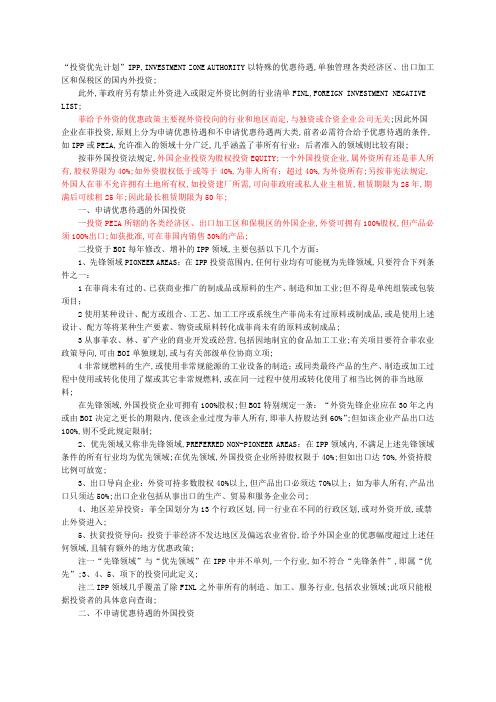
“投资优先计划”IPP,INVESTMENT ZONE AUTHORITY以特殊的优惠待遇,单独管理各类经济区、出口加工区和保税区的国内外投资;此外,菲政府另有禁止外资进入或限定外资比例的行业清单FINL,FOREIGN INVESTMENT NEGATIVE LIST;菲给予外资的优惠政策主要视外资投向的行业和地区而定,与独资或合资企业公司无关;因此外国企业在菲投资,原则上分为申请优惠待遇和不申请优惠待遇两大类,前者必需符合给予优惠待遇的条件,如IPP或PEZA,允许准入的领域十分广泛,几乎涵盖了菲所有行业;后者准入的领域则比较有限;按菲外国投资法规定,外国企业投资为股权投资EQUITY;一个外国投资企业,属外资所有还是菲人所有,股权界限为40%;如外资股权低于或等于40%,为菲人所有;超过40%,为外资所有;另按菲宪法规定,外国人在菲不允许拥有土地所有权,如投资建厂所需,可向菲政府或私人业主租赁,租赁期限为25年,期满后可续租25年;因此最长租赁期限为50年;一、申请优惠待遇的外国投资一投资PEZA所辖的各类经济区、出口加工区和保税区的外国企业,外资可拥有100%股权,但产品必须100%出口;如获批准,可在菲国内销售30%的产品;二投资于BOI每年修改、增补的IPP领域,主要包括以下几个方面:1、先锋领域PIONEER AREAS:在IPP投资范围内,任何行业均有可能视为先锋领域,只要符合下列条件之一:1在菲尚未有过的、已获商业推广的制成品或原料的生产、制造和加工业;但不得是单纯组装或包装项目;2使用某种设计、配方或组合、工艺、加工工序或系统生产菲尚未有过原料或制成品,或是使用上述设计、配方等将某种生产要素、物资或原料转化成菲尚未有的原料或制成品;3从事菲农、林、矿产业的商业开发或经营,包括因地制宜的食品加工工业;有关项目要符合菲农业政策导向,可由BOI单独规划,或与有关部级单位协商立项;4非常规燃料的生产,或使用非常规能源的工业设备的制造;或同类最终产品的生产、制造或加工过程中使用或转化使用了煤或其它非常规燃料,或在同一过程中使用或转化使用了相当比例的菲当地原料;在先锋领域,外国投资企业可拥有100%股权;但BOI特别规定一条:“外资先锋企业应在30年之内或由BOI决定之更长的期限内,使该企业过度为菲人所有,即菲人持股达到60%”;但如该企业产品出口达100%,则不受此规定限制;2、优先领域又称非先锋领域,PREFERRED NON-PIONEER AREAS:在IPP领域内,不满足上述先锋领域条件的所有行业均为优先领域;在优先领域,外国投资企业所持股权限于40%;但如出口达70%,外资持股比例可放宽;3、出口导向企业:外资可持多数股权40%以上,但产品出口必须达70%以上;如为菲人所有,产品出口只须达50%;出口企业包括从事出口的生产、贸易和服务企业公司;4、地区差异投资:菲全国划分为13个行政区划,同一行业在不同的行政区划,或对外资开放,或禁止外资进入;5、扶贫投资导向:投资于菲经济不发达地区及偏远农业省份,给予外国企业的优惠幅度超过上述任何领域,且辅有额外的地方优惠政策;注一“先锋领域”与“优先领域”在IPP中并不单列,一个行业,如不符合“先锋条件”,即属“优先”;3、4、5、项下的投资同此定义;注二IPP领域几乎覆盖了除FINL之外菲所有的制造、加工、服务行业,包括农业领域;此项只能根据投资者的具体意向查询;二、不申请优惠待遇的外国投资一投资于菲出口企业:系指产品或服务包括旅游业的出口达到60%的生产、贸易或服务企业公司,或当地采购产品、60%出口的贸易公司;外国投资在该类企业可拥有100%股权,但不得与FINL发生冲突详见后;该类企业与前述IPP范围内的出口导向企业的主要区别是不享有优惠待遇;但如出口达70%,即使不在IPP范围之内,也可转而申请优惠待遇;二投资于菲国内企业:系指产品或服务100%对菲国内市场销售的生产企业公司,或原注册为出口企业、但其产品出口未达60%出口的企业公司;外国投资在该类企业可拥有100%的股权,但有限定条件:1、不在IPP范围内;2、不得与FINL冲突;3、销售仅限于批发,不得零售;考虑到IPP覆盖范围的广泛,同时又有FINL的限制,实际上留给投资的所谓“国内企业”已十分有限;三投资于限制外资股权的行业FINL:1、外资股权最高限于25%的行业:1私营对外劳务输出公司;2菲地方政府出资的公共设施和维修合同外国贷款或援助的招标项目除外;2、外资股权最高限于30%的行业:广告;3、外资股权最高限于40%的行业:1自然资源勘探、开发和利用如与菲政府签有资金和技术援助协议,外资可拥有100%股权;2私人土地所有权仅限以公司股权形式拥有;3公用事业水、电管理和运行;4教育机构的所有、设立和管理;5从事水稻、玉米的种植和加工;6SEC管理的金融公司;7为菲政府所有或控制的企业、公司、代理机构提供物资和商品的供货合同;8深海商业捕捞;9公寓所有权;10各类资产、信誉及财产评估公司;此外,经菲律宾国家特别部门批准,外资可在如下领域拥有40%的股权:1经菲国家警察署批准,可从事火器、黑色火药、甘油炸药、爆破器材、望远镜及其它类似器材的生产、维修、仓储或生产过程中所需产品及配料的分销;2经菲国防部门批准,外国投资可从事枪支弹药、军舰和军用船只以及类似设备和训练器材、配件的生产、维修、仓储或生产过程中所需产品及配料的分销;3危险药品的生产;4菲法律允许的桑拿、蒸汽浴、按摩诊所等类似行业;5赛马等非赌博形式的博彩业;申请优惠外国投资不申请优惠外国投资----------------------------------------------------------------------------投资领域股权上限出口要求投资领域股权上限出口要求----------------------------------------------------------------------------PEZA 100% 100% 国内企业100% 无----------------------------------------------------------------------------IPP先锋100% 无出口企业100% 60%----------------------------------------------------------------------------IPP优先 40% 无FINL 25-40% 无----------------------------------------------------------------------------IPP出口 40%以上 70%导向企业菲人所有:50%----------------------------------------------------------------------------偏远省份100% 无IPP优先----------------------------------------------------------------------------三、禁止外资进入的行业FINL1、大众传媒音像录制除外;2、执照专业服务法律特许的除外;3、注册资本低于250万美元的商业零售;4、供电所;5、私人保安机构;6、小型矿业开采;7、菲内海、领海或专暑经济区域的海洋资源开发与利用;8、斗鸡业的所有、经营和管理;9、核武器及生化、放射性武器的生产、维修、仓储及分销;10、烟花炮仗及烟火器材;四、外资企业享受的优惠待遇一在PEZA范围内投资的外国企业,享有以下优惠待遇:1、4年免缴企业所得税,最长可延至8年;2、所得税免缴期结束,可选择缴纳5%的“毛收入税”GROSS INCOME TAX,以代替国家中央和地方税;3、进口资本货物设备、散件、配件、原材料、种畜或繁殖用基因物质,免征进口关税及其它税费;同类物品如在菲国内采购,可享受税收信贷TAX CREDIT,即先按规定缴纳各项税费,待产品出口后再返还包括进口关税部分的折算征收、返还;4、免缴码头税费和出口税费5、给予外国投资者及其家属永久居留身份;6、简化进口程序;7、可聘用外籍雇员;二在IPP范围内投资的外国企业,享有以下优惠待遇:1、免缴所得税:投资先锋领域,字注册之日起,6年免缴所得税;投资优先领域,自注册之日起,4年免缴所得税;具备以下条件之一者,上述两类投资的所得税免缴期分别可延长一年:1按BOI规定的比例使用当地原料;2符合BOI规定的资本设备与雇员比例;3前3年每年外汇收入不低于50万美元;无论何种情况,先锋企业免缴所得税不超过8年;经批准,企业扩展经营规模,从新的经营之日起,视其扩展规模,再延长3年;2、企业注册之日起5年内,如符合BOI规定的资本设备与年雇员比例,新增雇员包括熟练工与非熟练工工资所得税减免50%;若企业位于经济欠发达区,减免75%;3、免缴契约税;国家项目和地方项目一视同仁;该优惠同时给予外资出口导向企业;4、农业项目自注册或商业运行10年之内,繁殖用牲畜或遗传物品免征进口关税;使用菲本国繁殖用牲畜或遗传物品,享受税收信贷;5、简化海关手续,自由使用寄售设备/货物,出口型企业可使用保税仓库,非传统出口商品免征码头税和出口税;6、注册之日起5年内,可聘用外籍监理、技术人员或顾问,期限可适当延长;外资所有的公司或相应机构的董事长、总经理和总会计师不受年限限制;7、生产出口产品及其配件所需的原材料、零配件和半成品可享受税收信贷;8、使用保税仓库、出口产品达70%以上的企业,进口零配件免缴各种税费;9、如外方拥有多数股权,自企业登记注册起5年之内,可雇佣高级外籍管理人员,包括董事长和总经理;外籍雇员可携带配偶和21岁以下的未婚子女;经BOI登记注册、在菲经济欠发达区投资的外国企业,无论是新建企业还是现有企业追加投资或扩大经营规模,除上述优惠待遇外,还可享有:1自注册之日起,6年免缴所得税同先锋企业;2企业批准运营后,其基础设备建设100%免缴所得;3新增雇员包括熟练工和非熟练工100%免缴所得;4投资优先领域可拥有100%股权;五、各类外资企业登记注册程序外国投资企业在菲登记注册,按是否申请优惠分属或涉及不同职能部门,而公司性质不同,申办程序有别;菲政府负责国内外投资登记注册的部门有:1、证券署SEC;2、投资署BOI;3、经济区署PEZA;4、贸工部DTI;按公司性质区分,菲将公司分为两大类:一类是股份制公司CORPORATION和合伙人公司;六、菲律宾经济区及其管理政策菲律宾政府一直致力于推动其经济和金融体制改革,以减少政府管制,推进各经济部门自由化,为其经济的发展创造一个良好的宏观环境;经过多年的努力,菲律宾已相继解除了对电讯、航运、石油、银行和保险业的管制,与亚洲国家建立了良好的经济贸易关系,实现了商业自由化,使菲律宾在吸引外国投资方面的竞争力有了明显的提高;为加大引资力度,吸引更多外国投资进入菲律宾亟待发展的行业,提高菲律宾在国际市场的竞争力,菲律宾政府积极改善投资环境,采取了一系列鼓励投资的政策措施,如不断开放外商投资领域;允许外国投资者拥有100%股权;对出口导向型企业实行投资优先计划IPP等;建立和发展各类经济区,为国内外投资者提供特殊的优惠待遇,是其重要而卓有成效的引资措施之一;菲律宾经济区概况一菲律宾经济区的发展菲律宾政府早在70年代初就开始设立经济区,到1986年相继建成了四个出口加工区;此后,由于政治经济危机的爆发,经济区的发展处于停滞甚至倒退状态;1986年至1993年间,菲律宾出口加工区署EPZA所辖各类经济区的投资总额仅为127亿比索;自90年代初起,菲律宾经济区的发展逐步恢复了生机,到1995年菲律宾经济区开始进入高速发展阶段,1997年菲律宾经济区署PEZA所辖各类经济区的全年投资总额就达1597亿比索;在经历了4年的持续高速发展之后,从2001年开始,由于政局不稳、社会动荡、兵变频繁、绑架成风使外国投资者对菲律宾望而生畏,对菲律宾投资大幅下滑,2003年1-10月份PEZA所辖各类经济区的投资总额仅为223亿比索;经济区的设立和运营,对加大菲律宾吸引外国投资力度、增加就业人口、扩大贸易出口和促进国民经济的发展发挥了重要作用;1995年至2002年间,PEZA所辖各类经济区总共吸引投资8063亿比索,其中外国投资占亿比索,累计出口亿美元;2002年PEZA的总出口额达到亿美元,占菲律宾当年出口总额的65%,经济区内实现就业82万多人;二菲律宾经济区的类型菲律宾经济区主要由PEZA所辖的96个各类经济区和独立经营的Phividec工业区、Cagayan、Zamboanga、Subic、Clark自由港等组成;菲律宾政府在自行设立和运营经济区的同时,积极鼓励私营部门设立各种类型的经济区;所谓私营部门经营的经济区,是指园区的土地归私人所有,园区内的基础设施由私人经营者投资建设,面向国内外投资者开放,并享受政府经营的经济区的同等优惠待遇;在PEZA所辖的96个各类经济区中,私营部门经营的经济区占92个,区内投资的企业444个;由PEZA直接经营的经济区仅4个,区内投资的企业有436个;菲律宾经济区主要分为以下几类:1.工业园区IE:指在统一管理下,按照综合计划进行规划和开发的特定区域,园区提供基础设施、预先建成的标准厂房和公共设施;2.出口加工区EPZ:指座落于海关管辖领域以外的特别工业园区,主要生产出口产品;在出口加工区内的企业进口资本设备和原材料免税,并不受其他进口限制;3.自由贸易区:指临近进口港或航空港的独立区域,进口货物在此卸货后进行直接转运、贮存、重新包装、分类、混合或其他处理;如这些进口货物从自由贸易区转到非自由贸易区,须按照海关和国内税收的相关规章制度办理;4.农业经济区:指按照综合计划进行规划和开发的大片区域,园区位于利于农业或自然资源丰富的地区,为投资者提供由于出口的农业和自然资源性产品加工活动的基础设施;此外,还有投资、商业、金融中心,旅游消闲中心和促进软件、IT服务以及相关信息产品出口的信息技术园等其他类型的经济区;三菲律宾经济区的投资来源和行业分布从经济区的投资来源看,日本是菲律宾经济区最大的海外投资来源国;在1995年到2002年间,日本对菲律宾经济区的投资占PEZA投资总额的41%;美国占13%,居第二位;荷兰占8%;英国占6%;新加坡占5%;韩国占4%;德国占2%;台湾和马来西亚分别占1%;其他国家和地区的投资占1%;来自菲律宾国内的投资占投资总额的17%;从投资的行业分布看,电子业是主要的投资领域;在1995年到2002年间,电子业的投资占投资总额的58%;机电产品制造业占%;运输设备和汽车制造业占%;化工业占%;橡胶和塑料制造业占%;医药和医疗器械制造占%;成衣及纺织品生产占%;IT服务业占1%;其他行业占%;菲律宾经济区的管理一菲律宾经济特区法菲律宾经济区由中央政府、地方政府和私人部门创立,各经济区在国家授权下实行自我管理,在其区域内自主发展经济、金融、工业和旅游业;外国公民或企业可以独资或与菲律宾人合资在经济区内建立工业、国际贸易和商业企业,外资可拥有100%股权,其资产、收益和其他合法收入受到保护;经济区为投资者提供土地和建筑设施租赁服务,租期50年,可续延25年,但对投资者有最低的可自由兑换货币投资额要求;二菲律宾经济区管理机构和职责根据菲律宾经济特区法的规定,菲律宾经济区署PEZA按独立关税区对经济区实施管理和经营;PEZA 隶属于菲律宾贸工部,由十三人组成的董事会进行管理;贸工部部长任董事会主席,董事成员中有9名是相关部委的副部长;董事会负责审订经济区管理政策、发展规划和计划,批准建立和执行各项规章制度和标准等;PEZA的主要职责是与相关政府部门和当地政府协调经济区的发展政策、制订和实施经济区发展规划;按菲律宾经济特区法规定的原则运营、管理和发展经济区;对经济区内企业实施有效的注册登记管理、规范和监督企业的经营活动;通过建设、租用、许可、BOT、合资、大批购买等方式为经济区发展和运营提供必要的基础设施;监督私营经济区优惠政策的使用情况和守法情况等;三投资菲律宾经济区的优惠政策1企业可获得4年所得税免缴期,最长可延至8年;所得税免缴期结束后,可选择缴纳5%的“毛收入税”GROSS INCOME TAX,以代替所有国家中央和地方税,其中3%上缴中央政府,2%上缴地方财政;2进口资本货物设备、散件、配件、原材料、种畜或繁殖用基因物质,免征进口关税及其它税费;同类物品如在菲国内采购,可享受税收信贷TAX CREDIT,即先按规定缴纳各项税费,待产品出口后再返还包括进口关税部分的折算征收、返还;3经批准,允许企业生产产品的30%在菲律宾国内销售,但须根据国内税法纳税;4免缴码头税费和出口税费;5给予初始投资在15万美元以上的投资者及其配偶和未成年子女21岁以下在经济区内永久居留的身份,他们可以自由出入经济区,而不须向其他部门另行申请;6简化进出口程序;7允许聘用外籍雇员,为外国经理人员和技术人员办理2年的可延续工作签证,但外籍雇员数量不能超过企业总雇员的5%;8企业用于员工技术培训和提高管理能力的费用的一半可以从上缴中央政府的3%税收中扣除;四投资菲律宾经济区的注册程序1.投资菲律宾经济区,首先要向PEZA提交申请;1 按规定在PEZA领取并填写一系列申请表格,并对PEZA下属的项目评估机构PRED提交立项可行性报告2份;PRED需2周时间对此做出评估;2 PRED评估合格,将评估意见及相关文件转呈PEZA董事会,后者在2周内完成审批;自批准之日起,申办企业有20天时间作出决定,是否在登记注册协议上签字;2.经PEZA核发相关证明文件后,申办企业到证券署SEC办理登记注册,并提交以下文件:1 在SEC领取并填写申请表格,一式6份;2 经SEC确认,不与其它公司重复的注册企业名称;3 公司章程英文;4 菲移民局出具的外方股东常驻身份证明ACR/ICR、SIRV及外方股权认购人签证;5 菲银行出具的申办企业到位资金总额证明;6 菲银行出具的外方到位资金汇入汇款证明;7 如为合资企业,还需提交菲方董事会决议;如外国新建企业的性质为个人独资公司,直接到贸工部DTI办理登记注册手续;外国投资企业如需对其母国返回资本和汇出利润及收入包括红利、并且是以银行系统走帐所得的外汇返回或汇出,SEC还要求申办企业到菲央行BAP办理登记手续;如无需汇出,央行手续可免;外国公司免缴利润汇出税;3.在SEC登记注册完毕,还需到当地税务部门申办纳税编号,再到当地市政府市长办公室申办经营许可;如申办企业或公司的注册名称申请保护,还需到投资所在地的DTI地区办公室办理有关手续;上述程序完毕,即可正式开业;4.其他注意的事项:1在菲PEZA内投资建厂,一般是由申办企业自建厂房;自登记注册之日起,申办企业必须在45天之内提交有关厂房的设计和建筑要求,并自获批之日起一个月内开始施工;新建生产企业自登记注册之日起一年内投产;2在PEZA所属的各类经济区、出口加工区和保税区内从事专业仓储业务WAREHOUSING ACTIVITES,无论独资或合资,最低注册资本为200万美元;菲律宾国籍意思菲律宾公民、当地合伙企业或组织由菲律宾公民拥有;或在菲律宾法律规定下成立的菲律宾股份和投标权至少60%的企业,或者一个外国企业在菲律宾比注册并100%拥有的,但公司所有的投票权全部由菲律宾人拥有,但投票权全部由菲律宾人或当地份额超过60%的基金、养老基金的菲律宾籍受托人拥有的基金;60%的投票权和60%的董事必须由菲律宾公民承担;外资投资意思是由非菲律宾国籍的投资不管是以外汇或者其他资产形式转移到费率的投资;做生意是意思包括招揽订单、服务合同、开设办公室,不论是叫做分公司或代表处,派驻当地代表且在当地的时间超过180天;参与任何当地生意、公司或其他实体公司的管理、监督或控制。
国别贸易投资环境报告-菲律宾
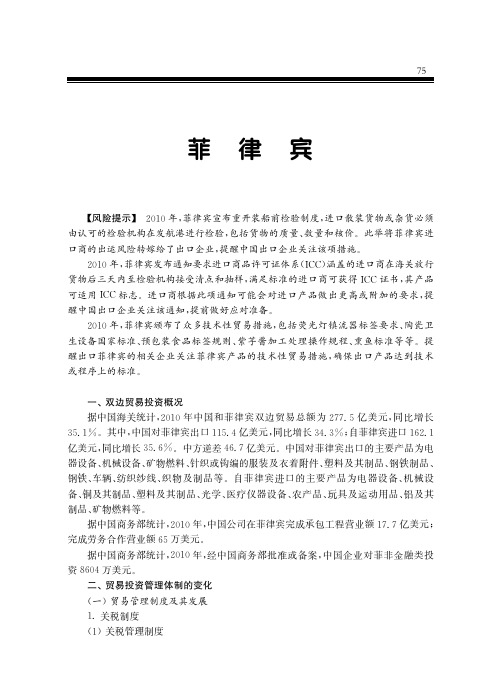
菲 律 宾
国别贸易投资环境报告2 0 1 1 7 8 正式重开装船前检验, 产品出口到菲的门槛将提高, 出现问题的货物将在出口国被制 止。早在2 菲律宾政府便宣布将逐渐取消货物装船前检验, 作为实施 0 0 0年 5月 2 9日 , 并中止与瑞士 SGS公司的合约。菲律宾过去是通过 全球贸易自由化的一项重要措施, 目的是确定货物在进口地的真正价值和税率, SGS公司来执行装船前货物检验的规定, 以防范走私、 瞒税及漏税行为。此次菲律宾重启装船前检验并宣布必维国际检验集团 ( 获得菲律宾货物检验公司认可委员会的授权, 对任何到菲律宾的散装货物或者杂 BV) 货实施装船前检验。目前必维国际检验集团在中国开展的装船前检验业务主要来自于 孟加拉、 刚果等国家, 这些国家基本都采用货物到达目的港后再进行检验。而 安哥拉、 核价等方面的问题, 在中国就被制止, 而不会 菲律宾则要求如果出口货物有出现数量、 到港后才滞留在菲律宾, 这种做法降低了菲律宾进口商的出运风险。 3.出口管理制度 菲律宾大部分产品可自由出口, 但对少数产品实行出口管制, 分为禁止出口和限 部分野生动物及活鱼等。 制出口两大类。禁止出口的产品主要包括苎麻种子及幼苗、 限制出口的产品主要包括矿产、水泥、石油及石油产品、军火及部分植物原材料等。 出口限制产品必须事先获得菲律宾农业部、环境和自然资源部等国家主管单位的 许可。 依据菲律宾《 综合投资法典》 出口发展法》 和其它法规的规定, 菲律宾对符合条件 、 《 的出口导向型企业和出口产品规定了优惠政策。优惠政策包括: 简化出口手续并免征 进口商品再出口可享受增值税退税、 外汇辅助以及使用出口加工区的低成 出口附加税, 免税进口生产出口商品所需原料, 保留1 给予出口融资, 本设施, 0 0%的出口外汇所得, 出口信用担保等。此外, 出口加工区、 保税仓库和各种类型的工业园区内的出口加工企 业, 还可享受原材料、 关税等方面的鼓励措施等。 4.贸易救济制度 和《 菲律宾的贸易救济法规主要包括《 、 《 1 9 9 9年反倾销法》 1 9 9 8年反补贴法》 2 0 0 0 年保障措施法》 以及上述法律的实施细则和条例等。 , 在反倾销程序中, 菲律宾贸工部下设的进口服务署( 负责工业产品的反倾 DT I B I S) 销调查, 菲律宾农业部 ( 负责农产品的反倾销调查。这两个机构主要负责受理申 DA) 请, 做出初步调查并决定是否实施临时措施。菲律宾关税委员会负责正式调查并向上 述两机构之一提交是否征收反倾销税的最终报告。菲律宾财政部下设的关税局负责执 行并征收反倾销税。 保障措施程序和反补贴程序与反倾销程序大致相同。但在特定情况下, 菲律宾农 业部可以对敏感农产品实施特殊保障, 要求菲律宾财政部下设的关税局征收不超过现 行关税税率三分之一的特殊保障税。 5.其他相关制度 菲律宾对不同的进口农产品, 有着不同的装运前检疫要求。其中, 对进口苹果、 柑 橘等水果类的装运前要求为: 货物须从原产地以封存的冷藏柜运输, 在运输途中不允许
国别贸易投资环境报告2009-菲律宾

菲 律 宾
【 风险提示】 包括从原产国装 0 天, 菲律宾动物进口检疫证明的有效期为出具后 6 运时间, 不得延长, 且该证明仅能使用一次, 当实际进口数量超过该证明所允许的进口 量时, 进口商必须另外申请动物检疫证明, 并且会对进口商处以罚款。 提醒有关企业注 意上述要求, 及时调整出口行为。菲律宾要求保障措施涉案企业在收到问卷 5 日内, 收 填好问卷, 向当地公证处公证, 并送外事办检查, 取得菲 集整理近六年的生产出口数据, 驻华使领馆的认证, 最后寄至菲律宾贸工部。 这一苛刻的时限要求限制了有关涉案企 业提交完整答卷, 维护自身合法利益。 一、双边贸易投资概况 据中国海关统计, 同比下降 2 0 0 8 年中国和菲律宾双边贸易总额为 2 8 5 . 8 亿美元, 中国对菲律宾出口9 同比增长2 自菲律宾进口1 6 . 7 %。其中, 0 . 8亿美元, 1 . 1 %; 9 5 . 0亿 美元, 同比下降1 5 . 3 %。中方逆差 1 0 4 . 2 亿美元。 中国对菲律宾出口的主要产品为机 电产品( 电器及电子产品、 半导体器件、 集成电路及微电子组件 ) 、 成品油、 谷物及谷物 料、 纺织纱线及制品等, 自菲律宾进口的主要产品为集成电路及微电子组件、 半导体器 电器及电子产品、 电感器及零件、 水果、 成品油等。 件、 据商务部统计, 中国公司在菲律宾完成承包工程营业额 3 新签 2 0 0 8年 , . 9 亿美元, 合同额为3 完成劳务合作营业额1 新签合同额2 . 6亿美元; 3 3万美元, 6 4 4万美元。 经中国商务部批准或备案, 中国非金融类企业对菲律宾投资1 2 0 0 8年 , 8 1 8万美元。 据中国商务部统计, 菲律宾对中国投资项目5 实际使用金额1 2 0 0 8年, 1个, . 3亿美元。 二、贸易投资管理体制的变化 菲律宾管理进出口贸易和投资的相关法律制度基本保持稳定。 菲律宾管 2 0 0 8年 , 理进出口贸易相关法律主要有2 , 该法对菲律宾管理进出 0 0 1年修订的《 1 9 9 1年海关法 》 口货物海关估价、 税费征收及海关监管等方面做出了规定; 《 出口发展法 》 是菲律宾促进 产品出口的主要法律依据。 《 综合投资法典》 是菲律宾投资方面的基本法, 该法规定了菲律宾的基本投资政策; 《 外国投资法典》 及其修正案进一步放宽了外国投资者在菲律宾的投资限制, 规定除法 律规定的禁止、 限制投资的领域之外, 外资可在菲律宾绝大部分的经济活动中投资经 营, 另外该法还规定了外资可以享受的基本权利。
菲律宾税务投资分析

菲律宾投资及税务分析一、菲律宾投资法规贸工部是负责投资政策实施和协调、促进投资便利化的主要职能部门。
贸工部下属的投资署(BOI)、经济特区管理委员会(PEZA)负责投资政策包括外资政策的实施和管理。
凡在菲律宾营运的国内外公司,只要向菲律宾投资局(the Board of Investments, BOI)注册,且受其监督,即可享有1987 年所制定的综合投资法案(The Omnibus Investments Code of 1987)对投资菲律宾所提供的奖励。
而随着投资法令松绑,除了禁止投资项目外,外国企业基本上可以在菲律宾投资任何产业。
菲律宾的企业型态大致可分为独资、合伙与公司。
一般来说,外商投资菲律宾时,可以设立子公司、分公司或办事处的方式来进行,兹就各设立态样所需条件说明如下:(一)企业设立1.公司设立菲律宾最常见的公司类型为股份公司(share corporation),股份公司系指须将公司资本分为股份,并在公司获利时,将盈余分配予其公司股东。
一般而言,在设立菲律宾公司时,需符合以下条件:(1)注册资金及条件资本额、股票型态与设立费用在公司设立时,所发行及实收资本额须为核定资本额的25% ,且不可低于5,000 菲币。
公司成立后,若有增减资或发行公司债融资需求,须得到过半数董事同意、三分之二以上股东同意以及证券监理委员会之同意,始可施行。
若公司实收资本额包含现金与现金以外财产者,公司在申请登记时,须检附相关财产契据、财产鉴价报告(财产移转价值须与在税上申报价值相同)、经公证的财产原始或移转登记、过去与目前财产税支付凭证等资料。
此外若其他债权人对该财产享有留置权(lien or encumbrances),则须检附其他债权人的同意书。
菲律宾公司可同时发行多种类型股票,且无股票最低面额的限制。
即使如此,普通股与特别股仍为最常见的分类,又分别称为「A 股」与「B 股」。
一般来说,只有菲律宾人可持有A 股,外国人只能持有B 股。
(菲律宾)国别报告

(菲律宾)国别报告对外承包工程国别市场指南(三)----菲律宾承包工程市场概况菲律宾共和国拥有8697万人口,是东南亚第二人口大国。
菲律宾矿产资源丰富,是东南亚最大产铜国和全球最大产金基地之一。
菲律宾是东南亚国家联盟(简称“东盟”)主要成员国,也是亚洲太平洋经济合作组织(APEC)成员国之一。
2005年中菲两国领导人确认建立致力于和平与发展的战略性合作关系。
随着菲律宾国内政治经济形势的好转,政府逐渐开始重视国内基础设施的建设,承包工程市场在政府公共建设支出的推动下出现了增长势头。
2006年建筑业产值为2351亿比索(按当年汇率约合46亿美元),增长速度达到7.3%。
为缩小与邻国差距,2007年政府推出了包括交通建设、供水、电力和通信等领域在内的10大基础设施建设项目名单,预计到2010前总投资将达到1.7万亿比索(约405亿美元)。
我国企业在菲律宾承包工程市场业务呈现较好发展态势,并已在交通运输、房屋建筑和电子通讯等领域取得一定业绩。
随着该国国内政治经济形势的好转,菲律宾承包工程市场将进一步发展。
在中菲经贸关系不断改善与加强的背景下,我国企业将在菲律宾承包工程市场面临更多的发展机遇。
第一节宏观环境律宾最大政党。
首都设在马尼拉。
阿罗约总统执政以来,提出一系列改革措施,发展经济,增加就业,国内生产总值保持了5%左右的速度增长。
同时政府出台多项措施,惩治腐败,打击恐怖主义,推动国内和平进程,整顿社会治安,旨在构建稳定的社会秩序。
目前,菲律宾已在反腐、反恐行动以及与反政府组织的谈判中均取得一定进展,国内政治、安全形势趋于好转。
受政府腐败、频繁的兵变、恐怖组织和反政府武装组织威胁等因素的影响,菲律宾政治也存在较大的不确定性。
长期以来,腐败问题是困扰菲律宾政府的痼疾。
阿罗约连任后,亲自领导由11人组成的“总统价值观形成委员会”,主抓政府打击贪污腐败的行动,以整顿官僚主义。
但这些措施并未取得实质效果。
在国际透明组织每年公布的各国腐败排行榜上,菲律宾总是处于最腐败的国家之列。
菲律宾的外国投资政策

菲律宾的外国投资政策
佚名
【期刊名称】《《中国纺织》》
【年(卷),期】2005(000)005
【摘要】菲律宾外国投资政策的主要依据是(E.0.226)和(R.a.7042).在此基础上,菲国家投资署(BOI,BOARD OF INVESTMENT)每年公布一个旨在鼓励国内外投资的"投资优先计划"(IPP.INVESTMENT ZONE AUTHORITY)以特殊的优惠待遇,单独管理各类经济区、出口加工区和保税区的国内外投资.
【总页数】1页(P168)
【正文语种】中文
【中图分类】F832.48
【相关文献】
1.从菲律宾外国投资法看我国外资法律制度的完善 [J], 陈发桂;韦杰
2.菲律宾外国投资法律制度研究及启示 [J], 罗刚;赵元松
3.菲律宾外国投资法简介 [J], 刘德标
4.菲律宾对外国投资的税收优惠 [J], ;
5.菲律宾的外国投资政策 [J],
因版权原因,仅展示原文概要,查看原文内容请购买。
菲律宾外商投资法
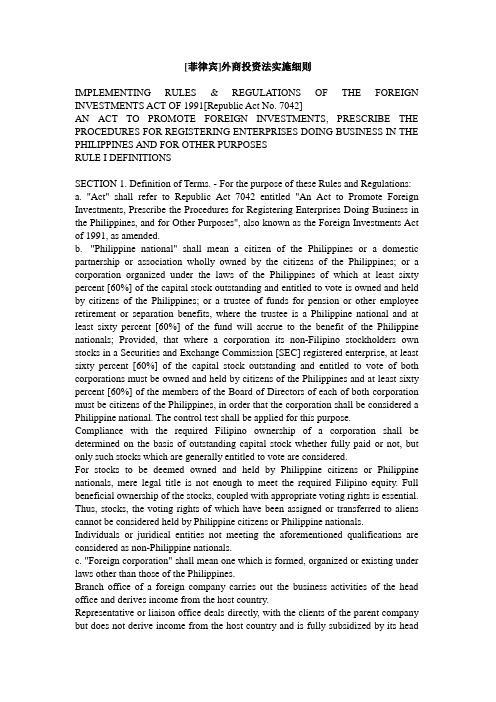
[菲律宾]外商投资法实施细则IMPLEMENTING RULES & REGULATIONS OF THE FOREIGN INVESTMENTS ACT OF 1991[Republic Act No. 7042]AN ACT TO PROMOTE FOREIGN INVESTMENTS, PRESCRIBE THE PROCEDURES FOR REGISTERING ENTERPRISES DOING BUSINESS IN THE PHILIPPINES AND FOR OTHER PURPOSESRULE I DEFINITIONSSECTION 1. Definition of Terms. - For the purpose of these Rules and Regulations: a. "Act" shall refer to Republic Act 7042 entitled "An Act to Promote Foreign Investments, Prescribe the Procedures for Registering Enterprises Doing Business in the Philippines, and for Other Purposes", also known as the Foreign Investments Act of 1991, as amended.b. "Philippine national" shall mean a citizen of the Philippines or a domestic partnership or association wholly owned by the citizens of the Philippines; or a corporation organized under the laws of the Philippines of which at least sixty percent [60%] of the capital stock outstanding and entitled to vote is owned and held by citizens of the Philippines; or a trustee of funds for pension or other employee retirement or separation benefits, where the trustee is a Philippine national and at least sixty percent [60%] of the fund will accrue to the benefit of the Philippine nationals; Provided, that where a corporation its non-Filipino stockholders own stocks in a Securities and Exchange Commission [SEC] registered enterprise, at least sixty percent [60%] of the capital stock outstanding and entitled to vote of both corporations must be owned and held by citizens of the Philippines and at least sixty percent [60%] of the members of the Board of Directors of each of both corporation must be citizens of the Philippines, in order that the corporation shall be considered a Philippine national. The control test shall be applied for this purpose.Compliance with the required Filipino ownership of a corporation shall be determined on the basis of outstanding capital stock whether fully paid or not, but only such stocks which are generally entitled to vote are considered.For stocks to be deemed owned and held by Philippine citizens or Philippine nationals, mere legal title is not enough to meet the required Filipino equity. Full beneficial ownership of the stocks, coupled with appropriate voting rights is essential. Thus, stocks, the voting rights of which have been assigned or transferred to aliens cannot be considered held by Philippine citizens or Philippine nationals. Individuals or juridical entities not meeting the aforementioned qualifications are considered as non-Philippine nationals.c. "Foreign corporation" shall mean one which is formed, organized or existing under laws other than those of the Philippines.Branch office of a foreign company carries out the business activities of the head office and derives income from the host country.Representative or liaison office deals directly, with the clients of the parent company but does not derive income from the host country and is fully subsidized by its headoffice. It undertakes activities such as but not limited to information dissemination and promotion of the company's products as well as quality control of products.d. Investment shall mean equity participation in any enterprise organized or existing under the laws of the Philippines. It includes both original and additional investments, whether made directly as in stock subscription, or indirectly through the transfer of equity from one investor to another as in stock purchase. Ownership of bonds [including income bonds], debentures, notes or other evidences of indebtedness does not qualify as investments.The purchase of stock options or stock warrants is not an investment until the holder thereof exercises his option and actually acquires stock from the corporation.e. "Foreign investment" shall mean an equity investment made by a non-Philippine national; Provided, however, That for purposes of determining foreign ownership, peso investments made by non-Philippine nationals shall be considered; Provided, further, That only foreign investments in the form of foreign exchange and/or other assets actually transferred to the Philippines and duly registered with the Central Bank (CB) and profits derived therefrom can be repatriated; and Provided, finally, That, for purposes of Section 8 of the Act, and Rule VIII, Section 6 of these Rules and Regulations, "Existing Foreign Investments" shall mean an equity investments made by a non-Philippine national duly registered with the SEC or the Bureau of Trade Regulation and Consumer Protection (BTRCP) in the form of foreign exchange and/or other assets transferred to the Philippines.f. "Doing business" shall include soliciting orders, service contracts, opening offices, whether liaison offices or branches; appointing representatives or distributors, operating under full control of the foreign corporation, domiciled in the Philippines or who in any calendar year stay in the country for a period totaling one hundred eighty [180] days or more; participating in the management, supervision or control of any domestic business, firm, entity or corporation in the Philippines; and any other act or acts that imply a continuity of commercial dealings or arrangements, and contemplate to that extent the performance of acts or works, or the exercise of some of the functions normally incident to and in progressive prosecution of commercial gain or of the purpose and object of the business organization.The following acts shall not be deemed "doing business" in the Philippines:1. Mere investment as a shareholder by a foreign entity in domestic corporations duly registered to do business, and/or the exercise of rights as such investor;2. Having a nominee director or officer to represent its interest in such corporation;3. Appointing a representative or distributor domiciled in the Philippines which transacts business in the representative's or distributor's own name and account;4. The publication of a general advertisement through any print or broadcast media;5. Maintaining a stock of goods in the Philippines solely for the purpose of having the same processed by another entity in the Philippines;6. Consignment by a foreign entity of equipment with a local company to be used in the processing of products for export;7. Collecting information in the Philippines; and8. Performing services auxiliary to an existing isolated contract of sale which are noton a continuing basis, such as installing in the Philippines machinery it has manufactured or exported to the Philippines, servicing the same, training domestic workers to operate it, and similar incidental services.g. "Export enterprise" shall mean an enterprise wherein a manufacturer, processor or service [including tourism] enterprise exports sixty percent [60%] or more of its output, or wherein a trader purchases products domestically and exports sixty percent [60%] or more of such purchases.h. "Exports" shall mean the volume of the Philippine port F. O. B. peso value, determined from invoices, bills of lading, inward letters of credit, loading certificates, and other commercial documents, of products exported directly by an export enterprise or the value of services including tourism sold by service-oriented enterprises to non-resident foreigners or the net selling price of export products sold by an export enterprise to another export enterprise that subsequently exports the same; Provided, That sales of export products to another export enterprise shall only be deemed exports when actually exported by the latter, as evidenced by loading certificates or similar commercial documents; and Provided, finally, That without actual exportation, the following shall be considered constructively exported for purposes of the Act: [1] sales of products to bonded manufacturing warehouses of export enterprises; [2] sales of products to export processing zone enterprises; [3] sales of products to export enterprises operating bonded trading warehouses supplying raw materials used in the manufacture of export products; and [4] sales of products to foreign military bases, diplomatic missions and other agencies and/or instrumentalities granted tax immunities of locally manufactured, assembled or repacked products whether paid for in foreign currency or pesos funded from inwardly remitted foreign currency.Sales of locally manufactured or assembled goods for household and personal use to Filipinos abroad and other non-residents of the Philippines as well as returning overseas Filipinos under the Internal Export Program of the Government and paid for in convertible foreign currency inwardly remitted through the Philippine banking system shall also be considered exports.i. "Output" shall refer to the export enterprise's total sales in a taxable year. The term sales shall refer to the value in case of heterogeneous products and volume in case of homogeneous products.Heterogeneous products shall refer to products of different kinds and characteristics as well as to those of the same kind but with various categories using different units of measurement.Homogeneous products shall refer to products of the same kind or category using a common unit of measurement.j. "Export ratio" shall refer to:1. the percentage share of the volume or peso value of goods exported to the total volume or value of goods sold in any taxable year if the export enterprise is engaged in manufacturing or processing;2. the percentage share of the peso value of services sold to foreigners to total earnings or receipts from the sale of its services from all sources in any taxable yearif the export enterprise is service-oriented; Value of services sold shall refer to the peso value of all services rendered by an export enterprise to foreigners that are paid for in foreign currency and/or pesos funded from inwardly remitted foreign currency as properly documented by the export enterprise; or3. the percentage share of the volume or peso value of goods exported to the total volume or value of goods purchased domestically in any taxable year if the export enterprise is engaged in merchandise trading.k. "Domestic market enterprise" shall mean an enterprise which produces goods for sale, or renders service or otherwise engages in any business in the Philippines.l. "Joint venture" shall mean two or more entities, whether natural or juridical, one of which must be a Philippine national, combining their property, money, efforts, skills or knowledge to carry out a single business enterprise for profit, which is duly registered with the SEC as a corporation or partnership.m. "Substantial partner" shall mean an individual or a firm who owns enough shares to be entitled to at least one [1] seat on the Board of Directors of a corporation, or in the case of a partnership, any partner.n. "Dangerous drug" as defined under Republic Act 6425 or the Dangerous Drugs Act, as amended, refers to either:1. "Prohibited drug" which includes opium and its active components and derivatives, such as heroin and morphine; coca leaf and its derivatives, principally cocaine; alpha and bet eucaine; hallucinogenic drugs, such as mescaline, lysergic and dicthlylamide [LSD] and other substances producing similar effects; Indian hemp and its derivatives; all preparations made from any of the foregoing; and other drugs and chemical preparations whether natural or synthetic, with the physiological effects of a narcotic or hallucinogenic drug; or2. "Regulated drug" which includes, unless authorized by the Department of Health [DOH] and in accordance with the Dangerous Drugs Board, self-inducing sedatives, such as secobarbital, phenobarbital, pentobarbital, barbital, amobarbital or any other drug which contains a salt or a derivative of salt of barbituric acid; any salt, isomer, or salt of an isomer, of amphetamine such as benzedrine or dexedrine, or any drug which produces a physiological action similar to amphetamine; and hypnotic drugs, such as methaqualone, nitrazepam or any other compound producing similar physiological effects.o. "Advanced technology" refers to a higher degree or form of technology than what is domestically available and needed for the development of certain industries as subject to guidelines of the Department of Science and Technology [DOST]. Its introduction into the country through foreign investments under the terms and conditions of the Act must be linked to its appropriateness and adaptability to local conditions with a view towards eventual transfer and applicability including the upgrading of the indigenous technology available.p. "Paid-in equity capital" shall mean the total investment in a business that has been paid-in in a corporation or partnership or invested in a single proprietorship, which may be in cash or in property. It shall also refer to inward remittance or assigned capital in the case of foreign corporations.q. "Foreign Investment Negative List [FINL]" or "Negative List" shall mean a list of areas of economic activity whose foreign ownership is limited to a maximum of forty percent [40%] of the outstanding capital stock in the case of a corporation, or capital in the case of a partnership.r. "NEDA Board" shall refer to the body constituted as such under Executive Order No. 230 entitled "Reorganizing the National Economic and Development Authority" and in which reside the powers and functions of the Authority.s. "NEDA" shall refer to the NEDA Secretariat, which is the body constituted as such under Executive Order No. 230 and which serves as the research and technical support arm and the Secretariat of the NEDA Board.t. "SEC" shall refer to the Securities and Exchange Commission.u. "BTRCP" shall refer to the Bureau of Trade Regulation and Consumer Protection as represented by the provincial offices of the Department of Trade and Industry [DTI].v. "BOI" shall refer to the Board of Investments.w. "Technology Transfer Board" shall refer to the Bureau of Patents, Trademarks and Technology Transfer (BPTTT).x. "Former natural born Filipino" shall mean those who have lost Philippine citizenship but were previously citizens of the Philippines falling in either of the following categories: [a] from birth without having to perform any act to acquire or perfect their Philippine citizenship; or [b] by having elected Philippine citizenship upon reaching the age of majority, if born before January 17, 1973, of Filipino mothers.y. "Transferee of private land" shall mean a person to whom the ownership rights of private land is transferred through either voluntary or involuntary sale, devise or donation or involuntary executions of judgment.z. "Direct employees" shall mean Filipino personnel hired and engaged under the control and supervision of the applicant investor/employer in the production of goods or performance of services. Excluded from this definition are personnel hired as casual, seasonal, learner, apprentice or any employee of subcontractor or those under fixed term employment.aa. "Start of commercial operation" shall mean the date when a particular enterprise actually begins production of the product for commercial purposes or commercial harvest in the case of agricultural activities. In the case of export traders and service exporters, the date when the initial export shipment in commercial quantity has been made or initial performance of service as borne out by the appropriate supporting documents.RULE II SCOPESECTION 1. Coverage. - The Act covers all investment areas or areas of economic activity except banking and other financial institutions which are governed and regulated by the General Banking Act and other laws under the supervision of the CB.RULE III BASIC GUIDELINESSECTION 1. The Act covers restrictions pertaining to foreign equity participation only. All other regulations governing foreign investments remain in force. SECTION 2. Monitoring of compliance with equity participation requirements. - The SEC or BTRCP, as applicable, shall monitor the compliance with the equity requirements of the Act.RULE IV REGISTRATION OF INVESTMENTS OF NON-PHILIPPINE NATIONALSSECTION 1. Qualifications. -a. Any non-Philippine national may do business or invest in a domestic enterprise up to one hundred percent [100%] of its capital provided:1. it is investing in a domestic market enterprise in areas outside the FINL; or2. it is investing in an export enterprise whose products and services do not fall within Lists A and B [except for defense-related activities, which may be approved pursuant to Section 8(b)(1) of the Act] of the FINL.Provided, further, That, as required by existing laws, the country or state of the applicant must also allow Filipino citizens and corporations to do business therein. b. Non-Philippine nationals qualified to do business per paragraph [a] above, but who will engage in more than one investment area, one or more of which is in the FINL, may be registered under the Act. However, said non-Philippine national will not be allowed to engage in the investment areas which are in the FINL.c. Existing enterprises which are non-Philippine nationals at the time of effectivity of the Act and which intend to increase the percentage of foreign equity participation under the Act, beyond that previously authorized by SEC, shall be governed by the qualifications in item [a] above. Thus, existing enterprises shall be allowed to increase the percentage share of foreign equity participation beyond current equity holdings only if their existing investment area is not in the FINL. Similarly, existing enterprises engaged in more than one [1] investment area shall be allowed to increase percentage of foreign equity participation if none of the investment areas they are engaged in is in the FINL.Existing foreign corporations shall be allowed to increase capital even if their existing investment area is in the FINL.Transfer of ownership from one foreign company to another shall be allowed even if the enterprise is engaged in an area in the FINL as long as there is the percentage share of foreign equity.SECTION 2. Application for registration. -a. Filing of Application. Applications for registration shall be filed with the SEC inthe case of foreign corporations and domestic corporations or partnerships which are non-Philippine nationals. In the case of single proprietorships, applications for Metro Manila shall be filed with the BTRCP or the DTI-National Capital Region. In the provinces, applications may be filed with the extension offices of the SEC for corporations/partnerships and the provincial offices of the DTI for sole proprietorships.b. Pre-Processing of Documents. Pre-processing of documents shall be undertaken to assist the investor in determining the completeness of his documents. All applications are considered officially accepted only upon submission of complete documents to either the SEC or BTRCP. Applications for clearances from the Department of National Defense [DND] or Philippine National Police [PNP] for defense-related activities, or the DOST for investments involving advanced technology shall be decided upon by said agencies within fifteen [15] working days.c. Approval. Within fifteen [15] working days from official acceptance of an application, the SEC or BTRCP shall act on the same. Otherwise, the application shall be considered as automatically approved if it is not acted upon within said period for a cause not attributable to the applicant.SECTION 3. Registration with the SEC. -a. Existing Requirements. As required by existing laws and regulations, an application form together with the following documents shall be submitted to the SEC:1. In the case of new domestic corporation or a partnership:i. Articles of Incorporation/Partnershipii. Name Verification Slipiii. Bank Certificate of Depositiv. ACR/ICR, SIRV [Special Investors Resident Visa], Visa No. 13 of the alien subscribersv. Proof of Inward Remittance [for non-resident aliens]2. In the case of a foreign corporation:i. Name verification slipii. Certified Copy of the Board Resolution authorizing the establishment of an office in the Philippines; designating the resident agent to whom summons and other legal processes may be served in behalf of the foreign corporation; and stipulating that in the absence of such agent or upon cessation of its business in the Philippines, the SEC shall receive any summons or legal processes as if the same is made upon the corporation at its home office.iii. Financial statements for the immediately preceding year at the time of filing of the application, certified by an independent Certified Public Accountant of the home country.iv. Certified copies of the Articles of Incorporation/Partnership with an English translation thereof, if in a foreign language.v. Proof of inward remittance such as bank certificate of inward remittance or credit advices.For representative offices, the amount remitted initially should be at leastUS$ 30,000.If the paid-in equity/capital is in kind, additional requirements shall be submitted to the SEC pursuant to its existing rules and regulations.All documents executed abroad should be authenticated by the Philippine Embassy or Consular Office.3. In the case of an existing corporation intending to increase foreign equity participation, all documents required of the proposed transaction under applicable laws, rules and regulations shall be submitted.b. Additional Requirements. As required by the Act, the following shall be submitted to the SEC:1. For enterprises wishing to engage in defense-related activities, clearance from the Department of National Defense [DND] or Philippine National Police [PNP].2. For small and medium-sized domestic market enterprises with paid-in equity capital less than the equivalent of US$200,000 but not less than the equivalent of US$100,000, a certificate from the Department of Science and Technology [DOST] that the investment involves advance technology, or a certificate from the appropriate Department of Labor and Employment [DOLE] Regional Office that the enterprise has issued an undertaking to employ at least 50 direct employees shall be submitted. The Dole through its Regional Offices, shall validate and monitor compliance by the investor to the undertaking that it will hire at least 50 direct employees within six [6] months from the start of commercial operations. Non-satisfaction of the undertaking shall be reported to the DOLE Regional Offices and to the SEC, which shall cause the investor to satisfy the appropriate higher investment requirement, with penalty for failure to satisfy the undertaking.3. For former natural-born Filipinos wishing to engage in investment areas allowed to them under this Act, the following documents are required:I. Copy of birth certificatea. Certified by the local civil registrar or the National Statistics Office [NSO]; orb. For those born abroad, certificate of birth from the appropriate government agency of the country where the birth is recorded showing the father or mother to be a Filipino at the time of birth or if the citizenship of the parents is not indicated, additional proof that the parent is a Filipino at the time of the applicant investor's birth.II. Those born before 17 January 1973 of Filipino mother must additionally submit all of the following: certified true copies of his/her sworn statement of election of Filipino citizenship, oath of allegiance from the civil registrar where the documents were filed and/or forwarded, and identification certificate issued by the Bureau of Immigration.III. In case of loss and/or destruction of the record of birth or non-registration of birth.Certificate of non-availability of birth certificate on account of loss and/or destruction of birth record from the local civil registrar and/or appropriate government agency if birth was registered abroad;Copy of birth certificate of mother or father certified by the local civil registrar or theNSO; andAffidavit of two [2] disinterested persons attesting to their personal knowledge that at the time of the applicant's birth, the child was born of a Filipino mother or father. Any document executed or issued abroad must be authenticated by the Philippine embassy or consulate having jurisdiction over the place of execution or issuance of the document.c. Application Fee. A reasonable application fee to be determined by the SEC shall be collected from each applicant.d. SEC Action. Upon fulfillment of all SEC requirements and favorable evaluation by the SEC, the Certificate of Registration under the Act for domestic corporations and partnerships, or license to do business in the case of a foreign corporation, shall be issued by the SEC. In case of disapproval, the SEC shall also inform the applicant in writing of the reasons for the disapproval of the registration.SECTION 4. Registration with the BTRCP-Department of Trade and Industry. - .a. Existing Requirements. As required by existing laws and regulations, BTRCP Form No. 17 and accompanying documents shall be submitted to BTRCP.All documents executed abroad should be authenticated by the Philippine Embassy or Consular Office.b. Additional Requirements. The additional requirements for corporations and partnerships provided under Sec. 3[b] hereof shall be complied with.c. Application Fee. A reasonable application fee to be determined by BTRCP shall be collected from each applicant.d. BTRCP-DTI Action. Upon fulfillment of all BTRCP-DTI requirements and favorable evaluation by DTI, the Certificate of Registration for Sole Proprietorship shall be issued by DTI. In case of disapproval, DTI shall also inform the applicant in writing of the reasons for the disapproval of the registration.SECTION 5. Registration of non-Philippine nationals intending to engage in the same line of business as their existing joint venture. -a. During the transitory period, any applicant who has an investment in an existing joint venture, in which he or his majority shareholder in the existing joint venture is a substantial partner, shall be registered with the SEC or BTRCP in the same line of business if the Filipino partners representing the majority of the Filipino equity in the existing joint venture certify under oath that they are not capable and willing to make the investment needed for the domestic market activities, which is being proposed to be undertaken by the applicant.b. If the Filipino partners are willing and able to make the needed investment, the SEC shall not register the applicant, in which case, both joint venture partners may agree to undertake the expansion. Both partners are then required to place the balance of their agreed upon investment shares within six [6] months from the date of the agreement. The Filipino partner[s] shall not be compelled to make additional investment for the proposed expansion of domestic market activities, if such will result in a higher Filipino equity share. If the Filipino partner[s] fails to infuse said capital within said period, per the report of the non-Philippine national applicant to the SEC, the SEC or BTRCP shall then allow the registration of said non-Philippinenational applicant as a separate enterprise under the Act.RULE V REGISTRATION WITH THE CENTRAL BANKSECTION 1. CB Requirements. - Enterprises seeking to remit foreign exchange abroad for purposes of remittance of profits and dividends and capital repatriation in connection with the foreign investment made pursuant to the Act shall be deemed registered with the CB after SEC or BTRCP registration. For this purpose, CB rules and regulations covering procedures for registration of foreign investments shall be observed.RULE VI FOREIGN INVESTMENTS IN EXPORT ENTERPRISESSECTION 1. Allowable foreign equity participation. - Foreign equity participation in export enterprises shall be allowed up to one hundred percent [100%] provided that the products and services of such enterprises do not fall within Lists A and B of the FINL.SECTION 2. Registration of export enterprises. - Export enterprises shall be deemed registered with the BOI pursuant to Section 6 of the Act upon registration with the SEC or BTRCP.Enterprises registered under the Act seeking to avail of incentives under E. O. 226 must apply for registration with the BOI. Rules and regulations on E. O. 226 shall be observed for this purpose.Within then [10] working days from the issuance of the certificate of registration, the SEC or BTRCP shall transmit to BOI copies of the Certificate of Registration together with the application form duly accomplished by the export enterprises. SECTION 3. Submission of reports. - All duly-registered export enterprises under this Rule shall submit to the Board of Investment a duly accomplished form within six [6] months after the end of each taxable year.Failure of export enterprises to submit the required reports within the prescribed period of time or the submission of fraudulent reports shall be a ground for the SEC or BTRCP to impose appropriate sanctions as provided for under Rule XVII, Section 1, of these Rules and Regulations.SECTION 4. Monitoring of compliance with the export requirement. - Upon receipt of the report submitted by the export enterprise, the BOI shall determine compliance of the enterprise with the export requirement. If the enterprise fails to comply with the export requirement, the BOI shall advise the SEC or BTRCP of said failure. The SEC or BTRCP shall require the firm to immediately increase its export to at least sixty percent [60%] of total sales. If the firm fails to comply with the order of the SEC or BTRCP without any justifiable reason, it shall be penalized in accordance with the provisions of Rule XVIII, Section 1 of these Implementing Rules and Regulations. The BOI, in consultation with the SEC and BTRCP, shall issue guidelines for this purpose.RULE VII FOREIGN INVESTMENTS IN DOMESTIC MARKET ENTERPRISESSECTION 1. Allowable foreign equity participation. - Foreign equity participation in。
菲律宾的外贸经济政策讲解
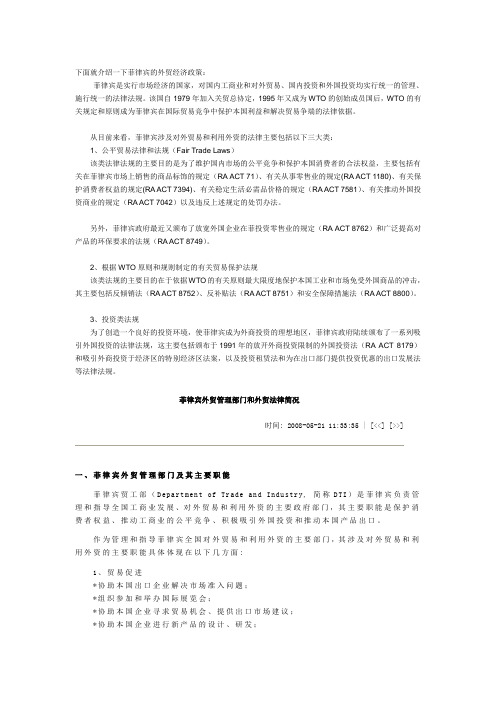
下面就介绍一下菲律宾的外贸经济政策:菲律宾是实行市场经济的国家,对国内工商业和对外贸易、国内投资和外国投资均实行统一的管理、施行统一的法律法规。
该国自1979年加入关贸总协定,1995年又成为WTO的创始成员国后,WTO的有关规定和原则成为菲律宾在国际贸易竞争中保护本国利益和解决贸易争端的法律依据。
从目前来看,菲律宾涉及对外贸易和利用外资的法律主要包括以下三大类:1、公平贸易法律和法规(Fair Trade Laws)该类法律法规的主要目的是为了维护国内市场的公平竞争和保护本国消费者的合法权益,主要包括有关在菲律宾市场上销售的商品标饰的规定(RA ACT 71)、有关从事零售业的规定(RA ACT 1180)、有关保护消费者权益的规定(RA ACT 7394)、有关稳定生活必需品价格的规定(RA ACT 7581)、有关推动外国投资商业的规定(RA ACT 7042)以及违反上述规定的处罚办法。
另外,菲律宾政府最近又颁布了放宽外国企业在菲投资零售业的规定(RA ACT 8762)和广泛提高对产品的环保要求的法规(RA ACT 8749)。
2、根据WTO原则和规则制定的有关贸易保护法规该类法规的主要目的在于依据WTO的有关原则最大限度地保护本国工业和市场免受外国商品的冲击,其主要包括反倾销法(RA ACT 8752)、反补贴法(RA ACT 8751)和安全保障措施法(RA ACT 8800)。
3、投资类法规为了创造一个良好的投资环境,使菲律宾成为外商投资的理想地区,菲律宾政府陆续颁布了一系列吸引外国投资的法律法规,这主要包括颁布于1991年的放开外商投资限制的外国投资法(RA ACT 8179)和吸引外商投资于经济区的特别经济区法案,以及投资租赁法和为在出口部门提供投资优惠的出口发展法等法律法规。
菲律宾外贸管理部门和外贸法律简况时间: 2008-05-21 11:33:35 | [<<] [>>]一、菲律宾外贸管理部门及其主要职能菲律宾贸工部(Department of Trade and Industry, 简称DTI)是菲律宾负责管理和指导全国工商业发展、对外贸易和利用外资的主要政府部门,其主要职能是保护消费者权益、推动工商业的公平竞争、积极吸引外国投资和推动本国产品出口。
在菲律宾投资经商的常见问题(税务、优惠政策、注册公司等)【模板范本】
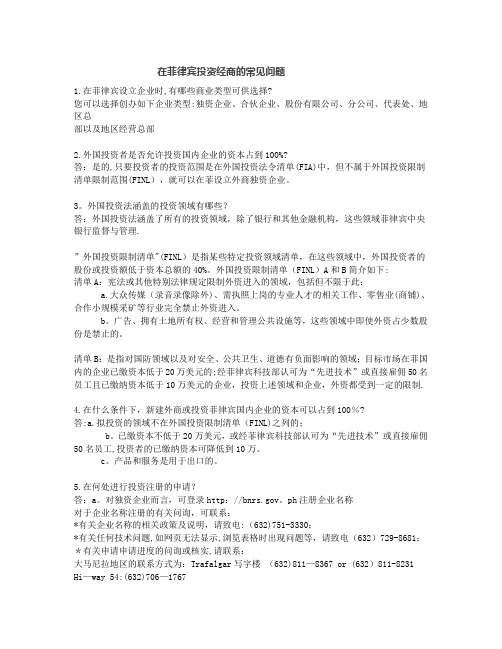
在菲律宾投资经商的常见问题1.在菲律宾设立企业时,有哪些商业类型可供选择?您可以选择创办如下企业类型:独资企业、合伙企业、股份有限公司、分公司、代表处、地区总部以及地区经营总部2.外国投资者是否允许投资国内企业的资本占到100%?答:是的,只要投资者的投资范围是在外国投资法令清单(FIA)中,但不属于外国投资限制清单限制范围(FINL),就可以在菲设立外商独资企业。
3。
外国投资法涵盖的投资领域有哪些?答:外国投资法涵盖了所有的投资领域,除了银行和其他金融机构,这些领域菲律宾中央银行监督与管理.”外国投资限制清单"(FINL)是指某些特定投资领域清单,在这些领域中,外国投资者的股份或投资额低于资本总额的40%。
外国投资限制清单(FINL)A和B简介如下:清单A:宪法或其他特别法律规定限制外资进入的领域,包括但不限于此:a.大众传媒(录音录像除外)、需执照上岗的专业人才的相关工作、零售业(商铺)、合作小规模采矿等行业完全禁止外资进入。
b。
广告、拥有土地所有权、经营和管理公共设施等,这些领域中即使外资占少数股份是禁止的。
清单B:是指对国防领域以及对安全、公共卫生、道德有负面影响的领域;目标市场在菲国内的企业已缴资本低于20万美元的;经菲律宾科技部认可为“先进技术”或直接雇佣50名员工且已缴纳资本低于10万美元的企业,投资上述领域和企业,外资都受到一定的限制.4.在什么条件下,新建外商或投资菲律宾国内企业的资本可以占到100%?答:a.拟投资的领域不在外国投资限制清单(FINL)之列的;b。
已缴资本不低于20万美元,或经菲律宾科技部认可为“先进技术”或直接雇佣50名员工,投资者的已缴纳资本可降低到10万。
c。
产品和服务是用于出口的。
5.在何处进行投资注册的申请?答:a。
对独资企业而言,可登录http://。
ph注册企业名称对于企业名称注册的有关问询,可联系:*有关企业名称的相关政策及说明,请致电:(632)751-3330;*有关任何技术问题,如网页无法显示,浏览表格时出现问题等,请致电(632)729-8681;*有关申请申请进度的问询或核实,请联系:大马尼拉地区的联系方式为:Trafalgar写字楼(632)811—8367 or (632)811-8231 Hi—way 54:(632)706—1767Park and Ride(马尼拉市政厅附近)(632)536—7153加洛干市:(632)332-0829*或前往首都的菲律宾贸工部,或前往大马尼拉地区Makati H。
《华侨华人菲律宾生活指南》《1987年综合投资法》名称和政策的宣告 投资委员会

《华侨华人菲律宾生活指南》《1987年综合投资法》名称和政策的宣告投资委员会一1987年综合投资法总则第一章名称和政策的宣告第一条简称——本命令称为《1987年综合投资法典》第二条投资政策的宣告——为了加速国民经济的健康发展,协调经济民族主义的原则和目标,追求有计划的、经济上可行的、实际的产业分散,推动中小企业发展,在鼓励竞争,阻止垄断的条件下,宣布以下国家政策;(1) 国家鼓励菲律宾私人和外商投资于工业、农业、林业、采矿业、旅游业和其他经济部门;相对于投资额,能大量地提供就业机会;增加本国土地、矿产、林业、水产和其他资源的生产率,并提高产品利用率;提高企业雇佣人员的技术才能;为未来的经济发展打下基础;迎接国际竞争的检验;加速本国欠发达地区的发展;并导致经济出口量和出口值的增加。
(2) 国家通过保障人民的社会、文化和生态生活的福祉,确保健康发展,为此目的,必要时将和受影响的社区协商。
(3) 国家将向那些能为达到这些目标做出重大贡献,若没有财政激励,就不可能立项,以优化国民经济发展所要求的地点、数量与速度建成的项目提供财政鼓励。
财政鼓励体系应设计用来补偿市场的不完善,对经济发展作出贡献的项目提供优惠,该鼓励体系花费小、成效大,且对管理者来说简便易行。
(4) 国家把私营部门(the private sector)当成经济增长的主要动力在这个方面,应鼓励私人的积极性,除非因出现紧急社会问题时,一般应采取对商业活动的开放和自我管理。
(5) 国家应主要发挥扶持性而不是竞争性的作用,提供商业活动发生的框架、气候和激励。
(6) 国家认识到本国及外国资本在菲律宾经济发展中能发挥适当的作用,政府的职责是界定这些作用,并提供它们进入和成长的气候。
(7) 国家认识到产业安宁是经济增长的基本因素,国家的主要责任是确保普及这样的条件。
(8) 应给予财政鼓励,刺激企业的创立并援助其初期的经营,并在其注册或开始营业之后不超过十年的时间里终止,对具体期限另有说明的除外。
菲律宾对外贸易投资合作的法规和政策大全

3菲律宾对外国投资合作的法规和政策有哪些?3. 1 对外贸易的法规和政策规定有哪些?3.11贸易主管部门[贸工部]贸工部(D TI)是菲律宾的外贸政策制定及管理部门,其前身为菲律宾商务部。
贸工部的职责是,制定综合的工业发展战略和进出口政策;创造有利于产业发展和投资的环境;促进竞争和公平贸易;负责双边和多边投资贸易合作的谈判;支持中小企业的发展,保护消费者权益。
贸工部的日常工作是定期回顾和评估国家出口状况、问题和前景;确定影响出口发展的主要问题;监督有关部门制定和实施质量控制,保证出口商品的质量管理;向国会建议有利于出口发展的立法;组织和参加国际贸易展览会;为国内外进出口商提供信息服务;整理进出口贸易数据库;对本国的消费者和贸易商进行培训||;审批各种贸易商会成立的申请;审批外资企业在菲律宾投资设厂;颁发进出口许可证。
贸工部下设的产品标准化局主要负责产品技术标准和法规的管理和实施;进口服务署主要负责特定产品进口法规的实施以及发起和指导反倾销、反补贴及保障措施的初步调查。
[其他部门]其他贸易有关部门还有:海关总署、国家经济发展署、中央银行、环境管理署、卫生部、技术转让署、食品和医药品局、危险药品局、渔业和水产资源局、国家肉类检疫委员会、计划工业局、能源管理署和服装纺织品出口局等。
菲律宾国家经济发展署(N A D A)下设的关税委员会负责关税政策的制定,包括关税的减让、变更、退还,负责反倾销和反补贴的公众昕证会和磋商以及保障措施的调查工作。
菲律宾财政部下设的关税局负责关税法律的具体实施和进出口关税、进口产品增值税及其他附加税的征收。
3.12贸易法规体系菲律宾是世界贸易组织(WTO)和亚太经合组织(APEC)成员,也是东南亚国家联盟(ASEA N)的成员国,实行多边的、自由的、外向型的贸易政策,同时对国内幼稚产业进行适当保护。
菲律宾政府对其贸易政策不断进行调整,并出台了一系列出口鼓励措施。
菲律宾管理进出口贸易的相关法律主要包括:《海关法》、《出口发展法》、《反倾销法》、《反补贴法》和《保障措施法》等。
菲律宾投资合作协议书

菲律宾投资合作协议书---协议编号:___________甲方(投资方):_____________________地址:_____________________________代表人:___________________________联系方式:_________________________乙方(合作方):_____________________地址:_____________________________代表人:___________________________联系方式:_________________________鉴于甲乙双方基于互利共赢的原则,拟在菲律宾进行投资合作,经友好协商,达成以下合作协议:一、合作内容1. 甲方同意向乙方投资人民币________万元,用于________项目(以下简称“项目”)的开发与运营。
2. 乙方负责项目的策划、管理及日常运营,确保项目按照预定计划顺利进行。
二、投资方式1. 甲方的投资将以现金形式一次性汇入乙方指定的银行账户。
2. 乙方应在收到投资款项后的__个工作日内,向甲方出具相应的收款凭证。
三、资金使用与管理1. 乙方应将甲方投资的资金专项用于项目的建设与发展,不得挪作他用。
2. 乙方需建立专项资金账户,对甲方投资的资金进行专账管理,并接受甲方的监督。
四、利润分配1. 项目运营产生的净利润,按照甲乙双方事先约定的比例进行分配。
2. 利润分配应在每个财务年度结束后的__个月内完成。
五、风险与责任1. 甲乙双方均应遵守菲律宾法律法规,任何一方违法行为导致的损失,应由责任方承担。
2. 因不可抗力因素导致项目无法正常运营时,双方应协商解决,合理分担损失。
六、争议解决1. 本协议在履行过程中,如发生争议,甲乙双方应首先通过友好协商解决。
2. 协商不成时,任何一方可提交至菲律宾仲裁委员会进行仲裁,仲裁裁决为终局性,对双方均有约束力。
七、其他事项1. 本协议自双方代表人签字盖章之日起生效。
